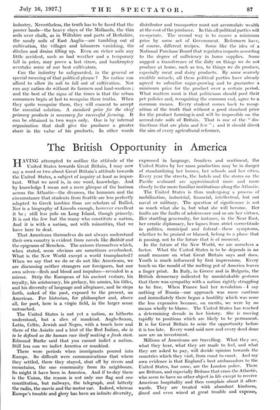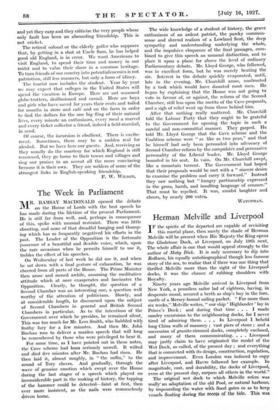The British Opportunity in America
T_TAVING attempted to outline the attitude of the 1Z United States towards Great Britain, I may now say a word or two about Great Britain's attitude towards the United States, a subject of inquiry at least as impor- tant. What we need is, in one word, knowledge. And by knowledge I mean not a mere glimpse of the horizon across the Atlantic—the divorces, the humours and the circumstance that students from Seattle are less perfectly adapted to Greek iambics than are scholars of Balliol. Nor is a biography of Lincoln enough, however excellent it be ; still less polo on Long Island, though princely. It is not the few but the many who constitute a nation. And it is with a nation, not with minorities, that we have here to deal.
That Americans themselves do not always understand their own country is evident from novels like Babbitt and the epigrams of Mencken. The axioms themselves which, when stated, seem obvious arc sometimes overlooked. What is the New World except a world transplanted? When we say that we do or do not like Americans, we are discussing neither strangers nor foreigners, but our own selves—flesh and blood and impulses—revealed in a mirror. Strip the European of his ancient vesture, his royalty, his aristocracy, his prelacy, his armies, his titles, and his diversity of language and allegiance, and he steps forth, naked of the past, exposed to the present, an American. For historian, for philosopher and, above all, for poet, here is a virgin field, in the larger sense untouched. .
The United States is not yet a nation, as hitherto understood, but a slice of. mankind. Anglo-Saxon, Latin, Celtic, Jewish and Negro, with a touch here and there of the Asiatic and a hint of the Red Indian, she is to be defined as the human race itself making a fresh start. Edmund Burke said that you cannot indict a nation. Still less can we indict America or mankind.
There were periods when immigrants poured into Europe. So difficult were communications that where they settled, there they stayed, shut off by rivers and mountains, the one community from its neighbours. So might it have been in America. And if to-day there is the Union, the reason is not only one flag and one constitution, but railways, the telegraph, and latterly the radio, the movie and the motor car. Indeed, whereas Europe's trouble and glory has been an infinite diversity, expressed in language, frontiers and sentiment, the United States by her mass production may be in danger of standardizing her homes, her schools and her cities. Every year the streets, the hotels and the stores on the Pacific seaboard are approximated more and more closely to the more familiar institutions along the Atlantic.
The United States is thus undergoing a process of mobilization, industrial, financial, intellectual, but not naval or military. The question of significance is not so much what she is, but what she will become. Her faults are the faults of adolescence and so are her virtues. Her startling generosity, for instance, in the Near East, her erratic diplomacy, her lapses from strict correctitude in politics, municipal and federal—these symptoms, whether to be praised or blamed, belong to a phase that is passing, not to the future that is of moment.
In the future of the New World, we are ourselves a factor. What the United States is to be depends in no small measure on what Great Britain says and does. Youth is much influenced by first impressions. Every touch on the mould of the melting pot of America leaves a finger print. In Italy, in Greece and in Bulgaria, the British democracy indicated by unmistakable gestures that there was sympathy with a nation rightly struggling to be free. When France had her revolution—I say nothing of Russia—our approach was more cautious and immediately there began a hostility which was none the less expensive because, on merits, we were by no means wholly to blame. The United States has reached a determining decade in her history. She is moving rapidly to positions which are likely to be permanent. It is for Great Britain to seize the opportunity before it is too late. Every word said now and every deed done now are an investment.
Millions of Americans are travelling. What they see, what they hear, what they are made to feel, and what they are asked to pay, will decide opinion towards the countries which they visit, from coast to coast. And my own evidence is that England's best ambassadors to the United States, bar none, are the London police. There are Britons, and especially Britons that cross the Atlantic, who seem to have no other object in life except to receive American hospitality and then complain about it after- wards. They are treated with abundant kindness, dined and even wined at great trouble and expense, and yet they carp and they criticize the very people whose only fault has been an abounding friendship. This is not cricket. The retired colonel or the elderly golfer who supposes that, by getting in a shot at Uncle Sam, he has helped good old England, is in error. We want Americans to visit England, to spend their time and money in our midst and to value their share in a common heritage. To turn friends of our country into potential enemies is not patriotism, still less manners, but only a form of idiocy. The tourist now includes the student. Year by year we may expect that colleges in the United States will spend the vacation in Europe. Here are not seasoned globe-trotters, disillusioned and casual. Here are boys and girls who have saved for years their cents and toiled for months in store and café and on the farm in order to find the dollars for the one big fling of their natural lives, every minute an enthusiasm, every meal a marvel and every ticket collector a friend, indeed a field-marshal, in need. Of course, the incursion is ebullient. There is excite- ment. Sometimes, there may be a sudden zeal for alcohol. But we have here our guests. And, receiving as they usually do the courtesy for which England is still renowned, they go home to their towns and villages and sing our praises in an accent all the more convincing because it is their own. They are welders of some of the strongest links in English-speaking friendship.
P. W. WILSON. P. W. WILSON.











































 Previous page
Previous page